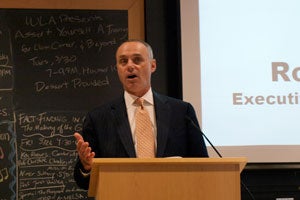As the three most popular sports leagues in the United States all confront the end of their collective bargaining agreements in 2011, industry representatives previewed the key issues affecting negotiation, during the second annual Sports and the Law Symposium held on March 26.
Sponsored by Harvard Law School’s Committee on Sports and Entertainment Law, the symposium featured panels with officials from the National Football League (NFL), National Basketball Association (NBA), and Major League Baseball (MLB), representatives from the leagues’ players associations and teams, and player agents. The event also included a presentation on the Sports Legacy Institute, established in 2007 to address the problem of sports concussions, and a tribute to Professor Paul Weiler for his groundbreaking work in sports and entertainment law at HLS.
Robert Manfred ’83, MLB’s executive vice president for labor relations, gave the keynote address [see video below]. He said that the spending disparity among baseball teams has been the most pronounced among all sports because large-market teams generate more local revenue. At the same time, he said, small-market teams have frequently remained competitive through the season and several have made recent World Series. Representing a league that canceled the World Series in the mid-’90s because of a labor dispute, Manfred expressed optimism that baseball – and, he hopes, the other leagues – will come to an agreement so that the games will carry on without interruption.
The NFL panel featured Adolpho Birch, vice president of law and labor policy, NFL; David Feher, partner, Dewey & LeBoeuf; Neil Cornrich, president, NC Sports; and Sarah Stuart, senior counsel, Reebok. Among the topics discussed were revenue sharing, the authority of the NFL commissioner to hand out penalties to players, concussions, endorsement contracts, and the antitrust case American Needle v. NFL.
Sitting on the NBA panel were Jeffrey Mishkin, partner, Skadden, Arps, Slate, Meagher & Flom; Hal Biagas, executive vice president of management, Wasserman Media Group; Michael Zarren ’04, assistant general manager and team counsel, Boston Celtics; and Robert Tilliss, CEO, Inner Circle Sports. The panel covered revenue sharing, the financial difficulty of franchises in smaller markets, the growing internationalization of the league, gambling in the wake of the betting scandal involving referee Tim Donaghy, player conduct, and the requirement that players cannot enter the NBA unless they are at least a year removed from high school.
The MLB panel consisted of Daniel Halem ’91, senior vice president, general counsel for labor, MLB; Derek Jackson ’99, vice president and general counsel, Florida Marlins; David Prouty ’86, chief labor counsel, Major League Baseball Players Association; Timothy Slavin, assistant general counsel, MLBPA; and Joseph Rosen, Partner, Brown & Rosen. They discussed the lack of a salary cap in baseball (the only major sports league without one), testing for performance-enhancing drugs, the draft, and the system of signing international players.
At the Sports Legacy Institute kickoff luncheon, HLS Lecturer on Law Peter Carfagna moderated a panel discussion with panelists Chris Nowinski, president and CEO, Sports Legacy Institute; George Atallah, assistant executive director for external affairs, NFL Players Association; NFL Player Pete Kendall; and Retired NFL Players Ted Johnson, Isaiah Kacyvenski and Christian Fauria. During the lunchtime talk, panelists discussed the NFL’s upcoming collective bargaining negotiations, as well as safety, health and brain trauma issues in the NFL.
